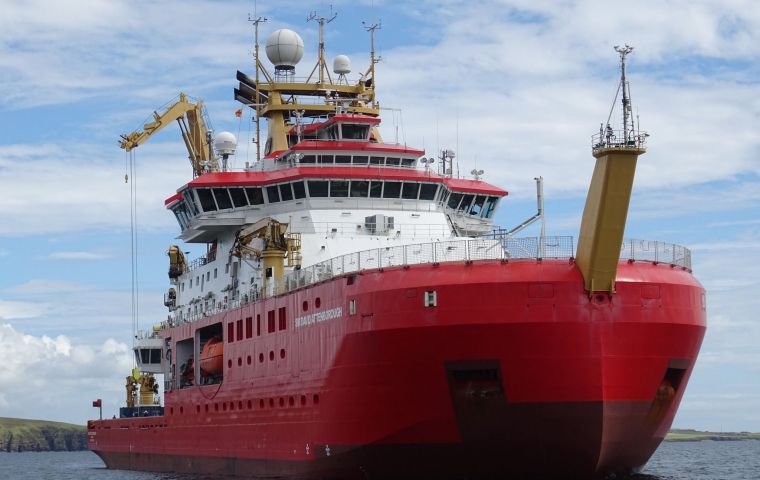MercoPress. South Atlantic News Agency
British Antarctic Survey (BAS) has officially launched its 2025/26 Antarctic field season
 The Falklands flagged polar research ship RRS Sir David Attenborough, where BAS scientists conduct multi-disciplinary research studying the ocean, seafloor, ice and atmosphere.
The Falklands flagged polar research ship RRS Sir David Attenborough, where BAS scientists conduct multi-disciplinary research studying the ocean, seafloor, ice and atmosphere. October 16 marked the arrival of the first aircraft at Rothera Research Station and the departure of the Falklands-flagged RRS Sir David Attenborough from the UK. The new season brings a full schedule of ambitious science, deep-field exploration, and major infrastructure milestones across the Antarctic and sub-Antarctic.
Over the next seven months, researchers and operational teams will deliver more than 60 science projects across five BAS research stations, aboard RRS Sir David Attenborough and at several deep-field and marine locations.
This year’s research program showcases a range of climate, ocean, glaciological and ecological research – including major international collaborations, advanced autonomous technology trials and a collection of long-term environmental data and observations.
Professor Dame Jane Francis, Director of British Antarctic Survey, said: “With the 2025/26 season underway, research supporting BAS’ long-term scientific strategy, Polar Science for a Sustainable Planet, continues. Recent news of global climate tipping points and extreme weather reinforces that research to understand the changing Antarctic is more vital than ever. Whether through modelling, monitoring or fieldwork, our science is central to understand how this region is changing and how this new knowledge will ensure more resilient communities in the UK and across the world.”
RRS Sir David Attenborough en route to Montevideo
The UK’s flagship polar research vessel begins a three-week, 6,000 -nautical-mile voyage to Montevideo, Uruguay and onward to Antarctica. As part of BAS’ work to decarbonize, the ship is making the journey using hydro treated vegetable oil (HVO) – a biofuel helping to reduce the organization’s carbon footprint. Cargo for the research stations includes: 1.2 tons of baked beans, 15,000 teabags and 2 tons of bread flour.
Major research highlights this season include:
POLOMINTS: Studying how underwater waves mix ocean heat and nutrients, linking glacier calving to ocean circulation, with teams based at both Rothera Research Station and on board the RRS Sir David Attenborough.
REWIND: Ice-core drilling to reconstruct 11,000 years of carbon exchange between the Southern Ocean and the atmosphere, taking place near Sky Blu (440 NM south of Rothera Research Station).
Thwaites Glacier: Partnering with the Korean Polar Research Institute to hot-water drill through this major West Antarctic glacier. The aim is to understand ice–ocean melt processes, to see how this critical part of Antarctica is contributing to global sea level rise now and in the future.
IRON-MAN: Investigating how iron and manganese control Southern Ocean productivity and carbon cycling, on RRS Sir David Attenborough.
POETS – Western Core Box (WCB): Tracking krill populations at South Georgia, crucial for regional biodiversity and understanding how the Southern Ocean absorbs carbon dioxide from our atmosphere. (BAS)




Top Comments
Disclaimer & comment rulesCommenting for this story is now closed.
If you have a Facebook account, become a fan and comment on our Facebook Page!